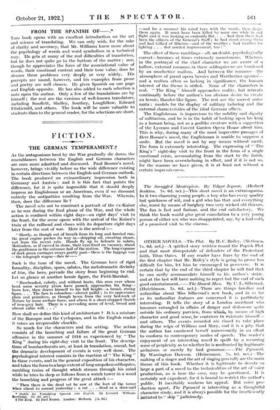FICTION.
THE GERMAN TEMPERAMENT.f
As the antagonisms bred by the War gradually die down, the resemblances between the English and German characters are once more admitted and discussed. Paul Rosner's novel, however, brings vividly before us the wide difference existing in certain directions between the English and German outlook.
The book produced an extraordinary impression both in Germany and Austria ; and it is this fact that points the difference, for it is quite impossible that it should deeply impress an Englishman or an American, even if we discount entirely the antipathies resulting from the War. Wherein, then, does the difference lie ?
The novel sets out to construct a portrait of the ex-Kaiser as he was during the final .phase of the War, and the whole action is confined within eight days—an eight days' visit to the front, for the scene opens with the arrival of the Kaiser's train at the railhead and closes with its departure eight days later from the seat of war. Here is the arrival :—
" Slowly, as though out of breath from its long and hurried run, the great engine pushes its way in—dripping oil, sweating steam, wet from the recent rain. Hands fly up to helmets in salute. Motionless, as if carved in stone, their eyes fixed on vacancy, stand the gentlemen in the entrance hall of the station. The long expanse of dark green carriages sways gently past—there is the luggage van —the telegraph wagon—then he—"
Such is the tone of the novel. The German love of rigid formality, discipline, spurs, salutes, the melodramatic divinity
of him, the hero, pervade the story from beginning to end. Let us glance at another heroic figure, the Field-Marshal.
" Bareheaded, calmly, and without haste, this man over whose head some seventy years have passed, approaches his King— bows low, then draws himself to his full height—a broad, strong figure.. . The face is colourless—almost pallid ; in its appearance plain and primitive, as though hewn from the very bed-rock of Nature by some archaic force, and above it a short-cropped thatch of iron-grey hair. There is a pervading sense of level, broad and almost cubic will. . . ."
How shall we define this kind of architecture ? It is a mixture of the Baroque and the Cyclopean, and in the English reader
it raises an irrepressible chuckle.
So much for the characters and the setting. The action consists of the launching and failure of the great German offensive in the sununer of 1918 as experienced by " The King " during his eight-day visit to the front. The descrip- tions of bombardments are, at least in translation, unreal, but the dramatic development of events is very well done. The psychological interest consists in the reaction of " The King " to these events, and in the general exposition of his character, and takes the form to a large extent of long unspoken soliloquies,
.rambling trains of thought which stream through his mind while he tries to sleep or follows from a watch tower in a wood the launching and progress of the great attack :-
"Then there is the dead rat he saw at the foot of the tower when about to ascend yesterday : a rat . . . dead as a door-nail • Models for Translating Spanish into English. By Leonard Williams.
Itoutledge. 13s..6d. net.] . .
t The Ling, 8y raul Rosner. London: Methuen, 14.6d.] and for a moment his mind toys with the words, then drop' them again. It must have been killed by some one while in Ant flight and it was looking so curiously flat. . . . And then there had been the officers of the General's Staff.; he had stood among them and had talked of Rheims—and of the weather : bad weather for fighting .• . that needed improvement, too ! " -
The effect of these ramblings—all, no doubt, psycholog7cally correct--Lbecomes at times extremely monotonous. Whereas, in the portrayal of the chief character we arc aware of a
hollow, external romance, in these soliloquies we are burdened by an unselective realism. And between the romance--the atmosphere of grand opera heroics and Werthcrian agonies—
and a realism often so lacking in significance, the human interest of the theme is stifled. None of the characters is real. " The King " himself approaches reality, but retreats
continually before the author's too obvious desire to create an heroic, Hamlet-like figure. The rest arc the merest auto-
mata : models for the display of military tailoring and the external characteristics of the ideal German officer.
The Englishman is impervious to the nobility and dignity of militarism, and he is in the habit of looking upon his king as a human being, not as a godlike creature with a suggestion of the Lyceum and Covent Garden Opera House about him.
This is why, during many of the most impressive passages of Herr Rosner's novel, the Englishman is unable to suppress a smile. But the novel is not by any means without merit.
The form is extremely interesting. The expressing of " The King's " eight-day visit to the front in the form of a single emotional crisis, accumulating from the start to the finish, might have been overwhelming in effect, and if it is not so,
for the reasons we have given, it is at least not without a certain impressiveness.


































































 Previous page
Previous page